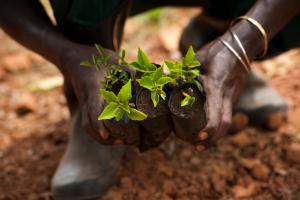CENTER FOR INFECTIOUS DISEASE RESEARCH AND POLICY by Lisa Schnirring Feb. 17, 2015
The United Nations Food and Agriculture Organization (FAO) today announced a new $5 million initiative for rural parts of Guinea that pairs Ebola prevention messages with help for farmers whose livelihoods and food supply have been hurt by the epidemic. (Scroll down for three additional links.)
 ... the FAO said the agreement also involves the World Bank and Guinea's government. Unlike in Liberia and Sierra Leone, Ebola activity in Guinea has seen multiple dips and spikes, and community resistance incidents have continued to stall response progress there, especially in rural areas.
... the FAO said the agreement also involves the World Bank and Guinea's government. Unlike in Liberia and Sierra Leone, Ebola activity in Guinea has seen multiple dips and spikes, and community resistance incidents have continued to stall response progress there, especially in rural areas.
In related developments, the United Nations Mission for Ebola Emergency Response (UNMEER) detailed more social mobilization activities planned for the region in parts of Liberia's Montserrado County and in Marbigi County, where cases were recently detected.
Social sensitization projects through the media have targeted several problem areas in Guinea, and recent activities there and in Liberia and Sierra Leone involve religious leaders in promoting safe burials and dispelling myths about Ebola.
Recent Comments